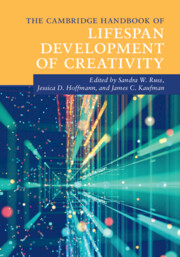Book contents
- The Cambridge Handbook of Lifespan Development of Creativity
- The Cambridge Handbook of Lifespan Development of Creativity
- Copyright page
- Dedication
- Contents
- Figures
- Tables
- Contributors
- Acknowledgments
- Introduction
- Part I Core Concepts of Lifespan Creativity Development
- 1 Basic Concepts of Creativity
- 2 The Creative Brain
- 3 Pretend Play
- 4 Creativity across the Lifespan
- Part II The Development of Creativity
- Part III Modes of Enhancement
- Part IV Environments and Contexts
- Part V Special Populations
- Index
- References
3 - Pretend Play
A Microcosm of Creativity
from Part I - Core Concepts of Lifespan Creativity Development
Published online by Cambridge University Press: 19 November 2021
- The Cambridge Handbook of Lifespan Development of Creativity
- The Cambridge Handbook of Lifespan Development of Creativity
- Copyright page
- Dedication
- Contents
- Figures
- Tables
- Contributors
- Acknowledgments
- Introduction
- Part I Core Concepts of Lifespan Creativity Development
- 1 Basic Concepts of Creativity
- 2 The Creative Brain
- 3 Pretend Play
- 4 Creativity across the Lifespan
- Part II The Development of Creativity
- Part III Modes of Enhancement
- Part IV Environments and Contexts
- Part V Special Populations
- Index
- References
Summary
Pretend play is indeed a microcosm of creative processes. With pretend play, we can observe the fundamental components of creativity. Pretend play is one arena in which we can identify the basic essentials of the creative process and learn about the development of the interaction of these processes. Pretend play is the expression of self-generated thought that includes divergent thinking, object substitution, symbolism, fantasy, affect themes, and narrative development. In play, children switch back and forth between spontaneous idea generation and the more controlled logic of the narrative. This chapter reviews the theories of play and creativity, and the correlational, longitudinal, and experimental research literature. The development of creative processes in play is discussed. Pretend play can be used as a measure of creativity. Suggestions for future investigation are offered.
- Type
- Chapter
- Information
- Publisher: Cambridge University PressPrint publication year: 2021

